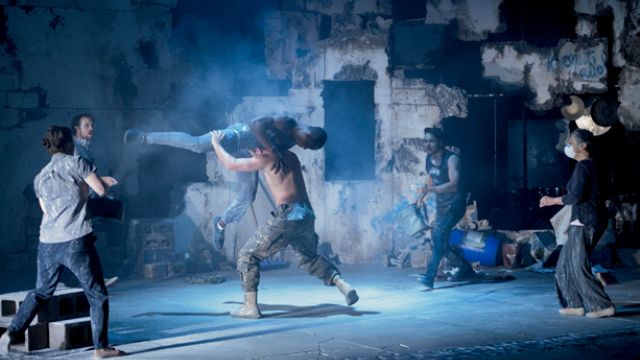Antigone
Publicity for this play describes it as dealing with the conflict between family and state loyalties in civil war; and, to a society not embroiled in civil war, the strife inherent in such conflict may remain abstract and seem irrelevant. But — Antigone’s conscience being pitted against that of her uncle, Creon, who has taken kingship of Thebes in its transition from military dictatorship back to fledgeling democracy — the play deals with the conflict occurring within the hearts of its protagonists more than with conflict as political fuel.
Damien Ryan’s programme notes’ observation that mortals “may bring disaster on themselves while acting with the best of motives” relates the political to the individual conflict. At the play’s unseen heart, Antigone’s motives, more interpersonal and adaptive, and Creon’s, more political and rigid, reflect character traits and the beliefs that sustain them: Antigone, a belief in treating all dead with respect due to the dead; Creon, a belief that a choice to act against the state’s decrees (which include those that he, as king for a day, has peremptorily issued, as he learns to his horror) must not go unpunished. The conflict that plays out between the two arises as much from these character traits’ and beliefs’ incompatibility as it does from the pure impulse of conscience.
Ancient as the play is, its adaptation has renewed its relevance to the modern state experiencing civil strife, and the Greek chorus worked fairly well in representing the democratic conscience that Creon was forced to deal with also. The set, an ultra-realistic creation by Melanie Liertz, might have represented mostly destroyed public buildings in any modern city devastated by mortar and bombing, and conveyed the insecurity that smashed walls offer. Live drumming added tension to this atmosphere, and convincing acting kept the audience attentive. In particular, Andrea Demetriades lived the grief that ruled Antigone in her decision to bury her dead brother at risk of the death penalty; William Zappa conveyed well Creon’s dual motivation by public and self interest; and Anna Volska was convincing as the blind seer Tiresias.
Antigone left the audience member to come to terms with the necessity of finding the life-affirming balance between consistency and forgiveness, between justice and flexibility, between order and humanity. The time seeing, hearing, and feeling this visceral, thought-provoking production is time well spent.
John P. Harvey
Photographer: John P. Harvey.
Subscribe to our E-Newsletter, buy our latest print edition or find a Performing Arts book at Book Nook.

